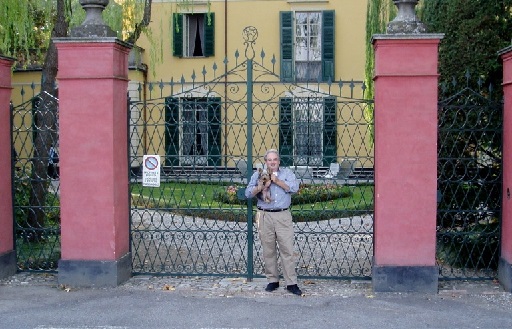A Riverdalian by choice, Maestro Michael Recchiuti has been a relevant “voice of reason” in the classical music world, bringing a much needed and sought after recording of Stefano Donaudy’s music. An ardent admirer of Giuseppe Verdi, Recchiuti was the ideal Maestro to interview in the year of Verdi’s 200th anniversary.
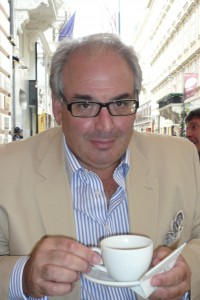
L’IDEA: Maestro Recchiuti, you have been Artistic Director of the American Opera Theater, Music Director of the Opera Ensemble of New York, founding Principal Conductor of the New Jersey Opera Theater, conductor of the Budapest Philarmonic and assistant conductor at Venice’s Teatro La Fenice, amongst the many other titles you have held, as a conductor, music director or artistic director. You are also an accompanist and a piano performer, besides a recording artist. Which activity would you say it’s most rewarding and which one the most demanding for you?
MAESTRO MICHAEL RECCHIUTI: The wonderful thing about being a musician is how many different activities in which you can be involved. Performing, recording, and teaching, both as a pianist and a conductor each have their own specific skill sets, and rewards. The important thing, I believe, is to remember that you are part of a continuum, a river that flows through life. For generations, musicians passed on their knowledge, their technique, their experiences to the next generation, and that you are only a single step in this progression. I am, besides whatever individual talents I possess, part of a process of transmission, and have an obligation to communicate with the public, in performance, and students, in my teaching this sum total of what I have received. In Western music, perhaps more than in the plastic or literary arts, oral transmission, and teaching by example are crucial to the survival of the forms. You cannot learn to sing from a book. You cannot interpret Verdi from the printed page without immense cultural grounding. I have been very fortunate, in that in my pianistic training I can trace my “family tree” back through Ferruccio Busoni, Franz Liszt, and ultimately, Beethoven. That is not to say that I can actually play like any of them, but I have been the beneficiary of their ideas. In my conducting training, I was fortunate to have had Carlo Maria Giulini, Bruno Bartoletti, and Joseph Primavera, who gave me essentially the history of being a conductor.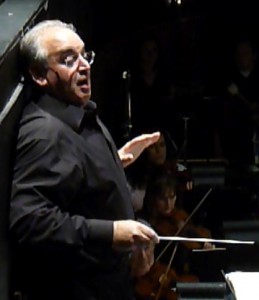
The most demanding part of my work is now simply working in what has become an unfriendly cultural environment for serious art, thanks to corporate and government agendas fostering stupidity, and the debasement of the experience of travel. Since our careers are based on traveling around the world to different theaters, and publics, travel is a primary preoccupation. When I began working, I was fortunate (or unfortunate, depending on how you look at it) enough to travel by ship, and with steamer trunks. Now we travel like cattle wedged into flying buses, like the steerage passage that my grandfather took from Italy, carrying little plastic bags.
L’IDEA: You have degrees from the Philadelphia College of the Performing Arts and the Manhattan School of Music and later you studied at the Accademia Chigiana in Siena, Italy, where you were awarded a ‘Diploma di Merito in Direzione della Lirica’. Would you compare your experiences in these schools?
M. RECCHIUTI: The different educational experiences were really about the level of the student. Early conservatory training is about instilling the rudiments of craft and technique. One must learn to play the instruments, music history, theory, etc. The more advanced studies, like those of the Chigiana, were more like a Greek classical training; there was more discussion of theory, refinement of approach. More work on nuance.
L’IDEA: Being in the Anno Verdiano, that is the year dedicated to Verdi, could you tell me what was your most remarkable experience with Verdi’s operas?
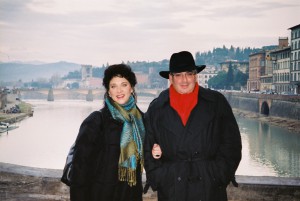
M. RECCHIUTI: The operas, and the person of Giuseppe Verdi have been crucial to my life. As a musician, I have always known the famous operas, and year by year in my studies, and my work, I have come to know and appreciate even the lesser known ones. My first professional job, as a teenager, was to prepare, and serve as prompter for a production of “Il Trovatore” in Washington DC – well back in the last century! My most memorable performance as conductor had to have been in Santiago di Compostela Spain, where I was assisting the late, great Nicolà Rescigno, of Maria Callas’ fame, on a production of “La Forza del Destino” with Giuseppe Giacomini as the tenor, set in the plaza in front of the Cathedral, and broadcast nationally on TV. All was going well until the day of the performance, when Mo. Rescigno was taken violently ill, and was flown back to Rome for surgery, and it devolved upon me to conduct the performance – with no rehearsal. I think it went well.
On a personal level, my connection with Verdi began in 1983, during my first trip back to Italy to study. I spent the first week in Bergamo with William Ashbrook, the great Italian opera scholar, and his wife. One day he said we were going down to Parma to see his colleague Pierluigi Petrobelli, who was the founder, and director of the Istituto per gli Studi Verdiani. It was a hot, hot June day, and we arrived at the rather modest offices of the Istituto. The Italians have never adequately supported their cultural endeavors, either in Italy or here in America. Pierluigi was a most charming man, who was personally responsible for the renaissance of Verdi studies in the world. Without his tireless work, there would be no Verdi Critical Edition. We became great friends over the years, and he was very helpful to me in questions about scores, and versions of the operas.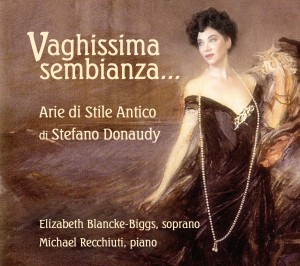
Petrobelli announced in the afternoon that we were invited to Sant’Agata for dinner, as it was the birthday of Signora Carrara-Verdi’s son. At sunset, we pulled into the gate of the Villa Verdi, and we were seated at Giuseppe Verdi’s dining room table, with the family, eating off of plates with the Maestro’s monogram! Pierluigi took us around the private quarters of the house, and showed us autograph manuscripts from the family collection, never made public, and the small monument that Verdi erected to his and Giuseppina’s little dog – Lulu – with the inscription “alla memoria d’un vero amico”. Years later, when I took Elizabeth to visit the villa, and we had our Yorkshire terrier, Alfredo (as he arrived right after Elizabeth’s Met debut in “La Traviata” he had to be Alfredo…), we were going to leave him in the car, and the guard insisted that we take him in with us, so he, too, got to visit the Maestro.
L’IDEA: Are you going to be involved in any projects for l’Anno Verdiano?
M. RECCHIUTI: The “Anno Verdiano” has been, in my opinion, rather disgracefully marked, both in America, and Italy. The Italians are in complete free fall in their theaters, and have been putting on some embarrassing shows. The major American theaters are really no better, as they no long seem to know the vocal demands of the various roles, or how to fill them. My contribution has been working, and preparing Elizabeth for her appearances on various festival concerts. Earlier this season she opened the Verdi Festival in Mexico City at the fantastic Palacio di Bellas Artes with a concert in which she sang seven of the most demanding Verdi arias on the same program. There are live recordings of the concert on her website (www.elizabethblancke-biggs.com).
L’IDEA: You have recently produced a recording titled ‘Vaghissima Sembianza…’ for La Sirena Records. Could you tell us something about this project and the composer Stefano Donaudy?
M. RECCHIUTI: For the centennial of Puccini’s “La Fanciulla del West”, Elizabeth was invited to Palermo’s Teatro Massimo to perform the work with Mo. Bruno Bartoletti, an old conducting teacher of mine. While we were there, I discovered the world of “Liberty” architecture, and the world of Palermo in 1900. I knew some of the songs of Stefano Donaudy, and then we investigated the rest, and fell in love with them. Donaudy’s songs are written in the style of the Italian baroque, but impose the vocal demands of the verismo singer, so they are perfect for Elizabeth. They range from the nostalgic, to the playfully erotic. We also made a documentary about the music which is on YouTube: “Vaghissima sembianza- the life, times, and music of Stefano Donaudy”. I began the company La Sirena Records to produce serious classical music, mostly vocal, as the major record labels can no longer produce quality recordings by other than “big name” artists. Their business model is upside-down, the company gets to spend, waste, and consume all the money, and the artist owns and earns nothing. At La Sirena, the artist owns the actual record, which we produce with a highly skilled team consisting of a great recording engineer, photographer, artist, and videographer. Let’s hope that there is still actually an audience for serious, beautiful music. I must believe that there is.
L’IDEA: Do you have any other plans as a producer for the near future?
M. RECCHIUTI: I would like to make some more recordings with Elizabeth and other artists. I would also like to produce some events of opera in concert with some great young singers singing repertoire that is not greatly represented currently; pieces like La Gioconda, Medea, La Vestale, etc. Writing more, and film making are also beginning to attract me.
http://www.elizabethblancke-biggs.com/CD


